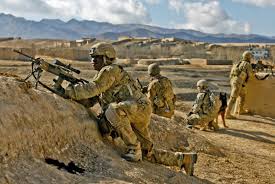New Study Finds Foreign Experiences With Gay Troops Relevant To U.S.
Military Journal Uses Israeli Data to Assess Claim that Foreign Experiences Don’t Matter
SANTA BARBARA, CA — A new study to be published this week argues that foreign military experiences are relevant for determining what would happen if the U.S. Congress rescinded the Don’t Ask, Don’t Tell Policy. The study will be published in “Armed Forces and Society,” a scholarly journal that is the official publication of the Inter-University Seminar, an academic network of military sociologists.
None of the twenty-three nations that permit gay soldiers to serve openly has reported problems. But experts who oppose lifting the American gay ban offer three reasons why foreign military experiences are irrelevant for determining what would happen if known gays were allowed to serve in the U.S. forces. The new study uses data from Israel to assess these three arguments.
The study, titled “Homosexuality and the Israel Defense Forces; Did Lifting the Gay Ban Undermine Military Performance?” was written by Aaron Belkin and Melissa Levitt. Belkin is Director of the Center for the Study of Sexual Minorities in the Military (CSSMM) at the University of California, Santa Barbara and Levitt is Adjunct Professor of Political Science at San Francisco State University.
First, opponents of gays and lesbians in the military say that foreign experiences are irrelevant for determining what would happen if the U.S lifted its ban because, even where legal, few gays actually come out of the closet in combat units of overseas militaries. According to Belkin and Levitt, however, known gays do serve in combat units of the Israel Defense Forces. They surveyed 136 Israeli combat soldiers and found that 17% know a homosexual peer in their unit.
Based on interviews with 35 academic and official experts as well as a review of 259 government documents and newspaper articles, Belkin and Levitt found no evidence that open gays have undermined Israeli military performance, cohesion, readiness or morale. Professor Stuart Cohen, a senior military expert at the Center for Strategic Studies at Bar-Ilan University told Belkin and Levitt that “homosexuals do not constitute an issue [with respect to] unit cohesion in the IDF. In fact, the entire subject is very marginal indeed as far as this military is concerned.”
Next, opponents of gays and lesbians in the military say that foreign experiences are irrelevant because gays and lesbians receive special treatment in overseas militaries. Based on their interviews and literature review, Belkin and Levitt found that despite the lack of perfectly equal treatment in all cases, most Israeli gay and lesbian soldiers are treated the same as their heterosexual peers most of the time. And, they found no evidence that rare cases of differential treatment undermined performance, cohesion, or morale.
Finally, opponents of gays in the military say that foreign experiences are irrelevant because of the uniqueness of American culture as well as U.S. military culture. Belkin and Levitt argue that all national cultures and military cultures are unique. Given that twenty-three countries have lifted their gay bans successfully, cultural differences do not seem to determine whether the lifting of a gay ban undermines the armed forces.
According to Nathaniel Frank, Communications Director of the CSSMM, “It has been 27 years since the Dutch military became the first to lift its gay ban, and twenty-two other nations have followed suit in the intervening years. If opponents of gays and lesbians in the military actually believe that lifting the ban would undermine the armed forces, why haven’t they produced any studies showing this to be the case?”
